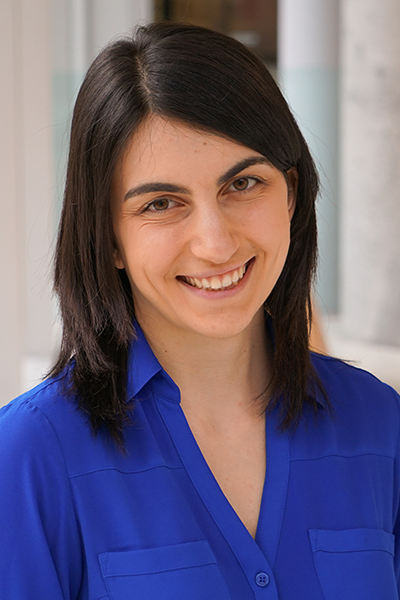Mobile Menu
- Education
- Faculty
- Research
- News & Events
- Divisions
- Equity, Diversity & Inclusion
- About Us

 Last month, the Department of Obstetrics and Gynaecology was ecstatic to hear that one of our own residents had been awarded the distinguished Vanier Canada Graduate Scholarship! This coveted award was presented to Dr. Maria Cusimano - a third-year resident with the Department and PhD student in Clinical Epidemiology at the Institute of Health Policy, Management, and Evaluation - for her research on oophorectomy, or surgical removal of the ovaries.
Last month, the Department of Obstetrics and Gynaecology was ecstatic to hear that one of our own residents had been awarded the distinguished Vanier Canada Graduate Scholarship! This coveted award was presented to Dr. Maria Cusimano - a third-year resident with the Department and PhD student in Clinical Epidemiology at the Institute of Health Policy, Management, and Evaluation - for her research on oophorectomy, or surgical removal of the ovaries.
The Government of Canada created the Vanier Scholarship in 2008 in order to strengthen Canada's ability to attract doctoral students and establish the country as a world leader in research and higher learning. Vanier Scholars are chosen based on academic excellence, research potential and leadership. Up to 166 scholarships are awarded each year across Canada with three years of funding provided by the Canadian Institutes of Health Research (CIHR), Natural Sciences and Engineering Research Council (NSERC), or Social Sciences and Humanities Research Council (SSHRC).
Dr. Cusimano was one of 21 exceptional doctoral students from the University of Toronto awarded for their health-related research projects. Her project, entitled "Practice Patterns and Long Term Adverse Health Outcomes of Bilateral Oophorectomy: A Population-Based Cohort Study", focuses on the risks of oophorectomy.
"It has indeed been a privilege of mine to be able to observe and celebrate Maria's successes as a role model within our department over the past five years," said Dr. John Kingdom, Chair of the ObGyn Department at UofT. "She will be an exceptional leader and investigator in our specialty in the years to come."
Hysterectomy, or surgical removal of the uterus, is the most common major surgery performed on non-pregnant women in North America. Bilateral oophorectomy (BSO), or surgical removal of the ovaries, has historically been offered at the time of benign hysterectomy in order to prevent ovarian cancer, which goes undetected by current screening tests and carries a poor prognosis. However, BSO triggers surgical menopause and may have harmful long-term effects. Several large observational studies have linked BSO before age 50 with increases in all-cause mortality, cardiovascular disease, dementia, osteoporosis, and certain cancers. However, these studies were methodologically limited and were unable to clearly establish the effect of BSO in different age groups.
Our study will use a large repository of data on Ontario residents held at ICES, a non-profit research institute, to answer key questions around BSO. We will describe trends in the use of BSO at benign hysterectomy in Ontario over time, and explore how the use of BSO varies based on patient and surgeon characteristics. We will also determine if BSO, compared to ovarian conservation, is associated with adverse cancer and non-cancer health outcomes and mortality. We will examine how rates of these outcomes change based on the age at which surgery is performed.
Our study will be the largest of its kind and will have significant implications for women’s health. By addressing the shortcomings of prior work, we will better quantify the health effects of BSO at different ages. This will provide vital information to both patients and providers facing an important decision at the time of an incredibly common surgical procedure. Our study will also be the first to identify groups of patients and providers most likely to select BSO in a Canadian context, thus allowing us to identify targets for knowledge translation.
See the other 2019 Vanier Scholars on the Government of Canada's website.
______________________________________
Don't want to miss a post? Follow us on social media for more news!
FACEBOOK | INSTAGRAM | TWITTER
If you would like to be a guest blogger, please contact us at obgyn@utoronto.ca.
